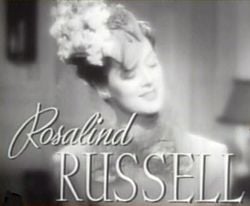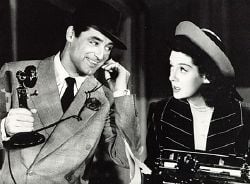Rosalind Russell
| Rosalind Russell | |
 in the trailer for The Women (1939) | |
| Date of birth: | June 4, 1907 |
| Birth location: | Waterbury, Connecticut, USA |
|---|---|
| Date of death: | November 28 1976 (aged 69) |
| Death location: | Beverly Hills, Los Angeles, California, |
| Academy Awards: | Nominated: Best Actress 1942 My Sister Eileen 1946 Sister Kenny 1947 Mourning Becomes Electra 1958 Auntie Mame The Jean Hersholt Humanitarian Award (1972) |
| Spouse: | Frederick Brisson (1941-1976) |
Rosalind Russell (June 4, 1907 – November 28, 1976) was a four-time Academy Award nominated and Tony Award winning American film and stage actress, perhaps best known for her role as a fast-talking newspaper reporter in the Howard Hawks screwball comedy His Girl Friday. She is tied with actress Meryl Streep) with the most Golden Globe Awards (for films) wins, with five. It is notable that she won every Golden Globe for which she was nominated.
Russell epitomized the highest qualities aspired of every performer. She was smart, beautiful, energetic, and charming. She modeled each of her screen roles after her own life's experiences.
Early life
Rosalind Russell was one of seven siblings born in Waterbury, Connecticut to James Edward and Clara Russell, an Irish-American Catholic family. Her father owned a successful law practice and her mother was a school teacher. She was not named after the character from Shakespeare's As You Like It, but rather after the ship on which her parents had traveled.
She attended the Notre Dame Academy in Waterbury, then Marymount College in Tarrytown, New York. Russell felt a calling to the theater and convinced her parents to allow her to attend the American Academy of Dramatic Arts in New York City. She started her career as a fashion model and in many Broadway shows. Soon after completing her studies she left for Hollywood.
In 1934 Russell was tested and signed exclusively with Universal Studios. However at the same time MGM offered her a contact with a better compensation package. She returned to Universal and successfully pleaded ignorance of Hollywood workings. Universal released her and she immediately signed with MGM for the next seven years. In the early 1930s, she began to work for MGM, where she starred in many comedies, such as Forsaking All Others (1934) and Four's a Crowd (1938), as well as dramas, including Craig's Wife (1936) and The Citadel (1938). In 1939, she was cast as a catty gossip in the all-female comedy The Women, directed by George Cukor.
She married Danish-American producer Frederick Brisson on October 25, 1941. Fred was often referred to in Hollywood as "The Lizard of Roz" due to his habit of getting choice Broadway play roles for the movie to be played by his wife Roz. They had one child in 1943, a son named Lance. Her father-in-law was the successful Danish actor Carl Brisson.
Career

She proved her quick-witted talent for comedy in the classic screwball comedy His Girl Friday (1940), directed by Howard Hawks. She played a quick-witted ace reporter who was also the ex-wife of her former newspaper editor (played by Cary Grant).
In the 1940s, she continued to make both comedies The Feminine Touch (1941); Take a Letter Darling (1942) and dramas Sister Kenny (1946); Mourning Becomes Electra (1947); The Velvet Touch (1948).
Russell scored a big hit on Broadway with her Tony Award-winning performance in Wonderful Town in 1953. The play was a musical version of her successful film of a decade earlier, My Sister Eileen. Russell reprised her starring role in the musical version in 1958 in a television special.
Probably her most memorable performance was in the title role of the long-running stage hit Auntie Mame (1956) and the subsequent movie version (1958), in which she played an eccentric aunt whose orphan nephew comes to live with her. When asked which role she was most closely identified with, she replied that strangers who spotted her still, called out, "Hey, Auntie Mame!"
From the late 1950s to the mid-1960s, she starred in a large number of movies, giving notable performances in Picnic (1956), Gypsy (1962) and The Trouble with Angels (1966).
Later Life and Legacy
Russell died after a long battle with breast cancer in 1976 at the age of 69, although initially her age was misreported because she had shaved a few years off her true age. She was survived by her husband and son. She is buried in Holy Cross Catholic Cemetery in Culver City, California.
Russell was the logical choice for reprising her role as "Auntie Mame" when its Broadway musical adaptation Mame was set for production in 1966. She claimed to have turned it down since she preferred to move on to different roles. In reality, she did not want to burden the public with her growing health problems, which included rheumatoid arthritis.
Her autobiography, written with Chris Chase, entitled Life is a Banquet, was published a year after her death. In the foreward (written by her husband), he states that Russell had a nervous breakdown sometime in the early 1940s. While there are few details regarding Russell's health, this book indicates that her health problems can be traced back to the 1940s.
In 1972 she received the Jean Hersholt Humanitarian Award for contributions to charity. She also was honored with a star on the Hollywood Walk of Fame, at 1708 Vine Street.
Filmography
- Evelyn Prentice (1934)
- The President Vanishes (1934)
- Forsaking All Others (1934)
- The Night Is Young (1935)
- The Casino Murder Case (1935)
- West Point of the Air (1935)
- Reckless (1935)
- China Seas (1935)
- Rendezvous (1935)
- It Had to Happen (1936)
- Under Two Flags (1936)
- Trouble for Two (1936)
- Craig's Wife (1936)
- The Candid Camera Story (Very Candid) of the Metro-Goldwyn-Mayer Pictures 1937 Convention (1937) (short subject)
- Night Must Fall (1937)
- Live, Love and Learn (1937)
- Man-Proof (1938)
- Four's a Crowd (1938)
- The Citadel (1938)
- Fast and Loose (1939)
- March of Time: The Movies Move On (1939) (short subject)
- The Women (1939)
- His Girl Friday (1940)
- No Time for Comedy (1940)
- Hired Wife (1940)
- This Thing Called Love (1940)
- You Can't Fool a Camera (1941) (short subject)
- They Met in Bombay (1941)
- The Feminine Touch (1941)
- Design for Scandal (1941)
- Take a Letter, Darling (1942)
- My Sister Eileen (1942)
- Flight for Freedom (1943)
- What a Woman! (1943)
- Screen Snapshots: 25th Anniversary (1945) (short subject)
- Roughly Speaking (1945)
- She Wouldn't Say Yes (1945)
- Sister Kenny (1946)
- The Guilt of Janet Ames (1947)
- Screen Snapshots: Famous Hollywood Mothers (1947) (short subject)
- Mourning Becomes Electra (1947)
- The Velvet Touch (1948)
- Tell It to the Judge (1949)
- A Woman of Distinction (1950)
- Never Wave at a WAC (1952)
- The Girl Rush (1955)
- Picnic (1955)
- Auntie Mame (1958)
- A Majority of One (1961)
- Five Finger Exercise (1962)
- Gypsy (1962)
- The Trouble with Angels (1966)
- Oh Dad, Poor Dad, Mama's Hung You in the Closet and I'm Feeling So Sad (1967)
- Rosie! (1967)
- Where Angels Go, Trouble Follows (1968)
- Mrs. Pollifax - Spy (1971)
| Awards | ||
|---|---|---|
| Preceded by: Ingrid Bergman for The Bells of St. Mary's |
Golden Globe Award for Best Actress - Motion Picture Drama 1947 for Sister Kenny |
Succeeded by: Rosalind Russell for Mourning Becomes Electra |
| Preceded by: Rosalind Russell for Sister Kenny |
Golden Globe Award for Best Actress - Motion Picture Drama 1948 for Mourning Becomes Electra |
Succeeded by: Jane Wyman for Johnny Belinda |
| Preceded by: Gertrude Lawrence for The King and I |
Tony Award for Best Leading Actress in a Musical 1953 for Wonderful Town |
Succeeded by: Dolores Gray for Carnival in Flanders |
| Preceded by: Kay Kendall for Les Girls |
Golden Globe Award for Best Actress - Motion Picture Musical or Comedy 1959 for Auntie Mame |
Succeeded by: Marilyn Monroe for Some Like It Hot |
| Preceded by: Shirley MacLaine for The Apartment |
Golden Globe Award for Best Actress - Motion Picture Musical or Comedy 1962 for A Majority of One 1963 for Gypsy |
Succeeded by: Shirley MacLaine for Irma la Douce |
| Preceded by: Frank Sinatra |
The Jean Hersholt Humanitarian Award 1972 |
Succeeded by: Lew Wasserman |
| Preceded by: Walter Pidgeon |
Screen Actors Guild Life Achievement Award 1975 |
Succeeded by: Pearl Bailey |
| Preceded by: Jerry Lewis 29th Academy Awards |
Oscars host 30th Academy Awards (with Bob Hope, Jack Lemmon, David Niven, and James Stewart) |
Succeeded by: Bob Hope, Jerry Lewis, David Niven, Laurence Olivier, Tony Randall, and Mort Sahl 31st Academy Awards |
ReferencesISBN links support NWE through referral fees
- Dick, Bernard F. Forever Mame: the life of Rosalind Russell. Hollywood legends series. Jackson: University Press of Mississippi, 2006. ISBN 9781578068906
- Russell, Rosalind, and Chris Chase. Life is a banquet. New York: Random House, 1977. ISBN 9780394421346
- Yanni, Nicholas. Rosalind Russell. New York: Pyramid Publications, 1975. ISBN 9780515037371
External links
All links retrieved July 26, 2016.
- Rosalind Russell at Find-A-Grave
- Profile - Turner Classic Movies.
- Ancestry.com
Credits
New World Encyclopedia writers and editors rewrote and completed the Wikipedia article in accordance with New World Encyclopedia standards. This article abides by terms of the Creative Commons CC-by-sa 3.0 License (CC-by-sa), which may be used and disseminated with proper attribution. Credit is due under the terms of this license that can reference both the New World Encyclopedia contributors and the selfless volunteer contributors of the Wikimedia Foundation. To cite this article click here for a list of acceptable citing formats.The history of earlier contributions by wikipedians is accessible to researchers here:
The history of this article since it was imported to New World Encyclopedia:
Note: Some restrictions may apply to use of individual images which are separately licensed.